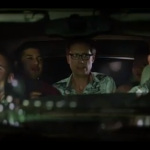“In the sight of God, what is the difference between a white man and black one?”
First told as an autobiographical story in Solomon Northup’s 12 Years A Slave published in 1853, the world was introduced to an extremely important piece of trying to decipher the horrifying truths that were the darkest years in American history. Now more than a century later, Steve McQueen takes his directorial talents in portraying this ugly period Once Upon A Time in the South.
Northup (Chiwetel Ejiofor), a free man (a raftsman, a farmer, and a well-respected fiddle-player) residing in Minerva, New York, is kidnapped one night after what he thinks is a meeting for potential work opportunity. Drugged and later tied down by chains, he wakes up to the next twelve years of his live as a tortured slave.
And Solomon Northup ain’t no slave! An elegant and gentle man whose sternness rarely ever breaks despite being a victim of evil, his experience isn’t easy to watch on screen. From one plantation and owner to another he is forced into a world of brutality and isolation, witnessing many heinous crimes that were never brought to justice due to loosely regulated Georgian laws and men with no souls—though, Northup’s first master Ford (Benedict Cumberbatch!) might have come really close to showing any sort of sincerity.
After Northup totally justifiably stands up for his human right to Ford’s cowardly show runner Tebeats aka Paul Dano (Prisoners), he is sent to Edwin Epps’ (Michael Fassbender): a wacky bible crazed plantation owner whose inner evils are projected in more twisted ways than one, particularly towards a young girl Patsey (Lupita Nyong’o) (imagine: a Michael Fassbender movie without a painful-to-watch sex scene).
Hope is found through a philosophical and well-traveled Canadian named Bass (Brad Pitt) who is also doing work for Epps. Northup confides in him based on his universal ideals and wisdom, and Bass then agrees to mail a letter of his whereabouts to Northup’s family up north where he is later reunited with them after the mind-altering time away from home.
So while we got an idea of this message of universality in The Butler, no where was it near as effective as watching 12 Years A Slave. I think Steve McQueen is the perfect director to actually pull this one off entirely to a degree that’s watchable seeing as he has a pretty good track record in confronting the absurd, though is there really a “tasteful” way to tell such a sad and even worse historically accurate story? However, the message is clear and everything about the movie attests to that, including the bone chilling violin-heavy score composed by Hans Zimmer.
(photo via Slate)




